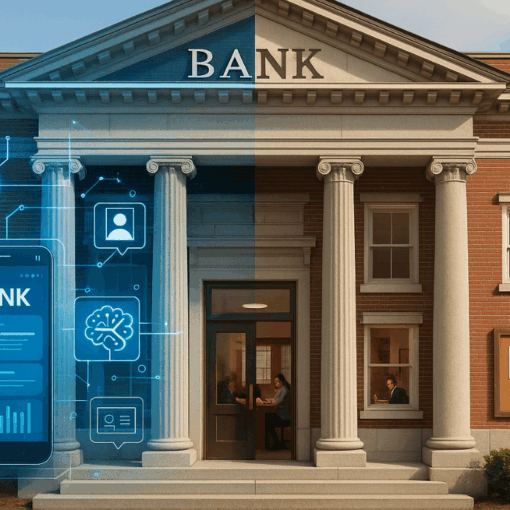The Artificial Intelligence Action Plan dropped from the White House this month, and here at PentEdge, we paid close attention. It is not every day that national policy intersects directly with the technology roadmaps we help build for banks and financial institutions.
This new federal push could very well reshape the way community banks operate. From risk models to fraud detection to AI-powered client service tools, the future is knocking. And it has got the full weight of government policy behind it.
So what exactly does this mean for your institution? Why is ICBA so involved? And more importantly, how can you prepare for what comes next?
We have dug into the details to bring you what matters most.
TL;DR: Fast Facts with Big Implications
- The Artificial Intelligence Action Plan was born out of an executive order focused on removing barriers to American leadership in AI.
- The plan is built around three strategic pillars: accelerating innovation, building AI infrastructure, and taking the lead globally in AI diplomacy and security.
- ICBA is actively advocating for community banks to gain fair access to AI opportunities without getting crushed by complex compliance.
- Community banks stand to benefit from AI in big ways: better fraud detection, customer support, loan analysis, and efficiency.
- Regulatory clarity is the missing piece, and ICBA’s upcoming AI framework will help fill that gap.
Why the Government Is Stepping Into AI Now
The release of the Artificial Intelligence Action Plan did not happen in a vacuum. It follows President Donald Trump’s executive order that called for eliminating obstacles to American AI leadership. This plan serves as the practical response to that directive, laying out how the U.S. will support homegrown AI development while keeping pace with global competitors.
This is not just a tech race. It is a policy race. Other nations are already defining AI laws, ethical frameworks, and data governance rules. If the U.S. wants a seat at the table, it needs to move now. That is the larger backdrop for this plan.
For community banks, though, the implications hit closer to home. And ICBA is making sure that those implications are clearly understood.
ICBA Has Entered the Chat (For Good Reason)
If you have followed our insights here at PentEdge, you know we believe community banks deserve a seat at every major technology conversation. The ICBA seems to agree.
In its comment letter to the National Science Foundation, the ICBA highlighted something we have been saying for a while now: AI can be a game-changer for community banks. It can power leaner operations, enhance customer engagement, and provide sharper tools for managing financial and cyber risk. But if regulations are designed only with big banks in mind, community banks will get left behind.
That is why the ICBA is doubling down. They are not only weighing in on federal AI plans but also preparing their own policy principles tailored specifically to community banking. The goal is simple: create a roadmap that supports innovation without sacrificing transparency, consumer protection, or institutional integrity.
What Community Banks Stand to Gain from the Artificial Intelligence Action Plan
From where we sit, this plan could finally open the gates for meaningful AI integration across small to midsized financial institutions. And that is not just a talking point.
When implemented with the right regulatory guardrails, AI brings several tangible benefits to community banking:
- It can streamline back-office workflows, saving time and resources.
- It can detect fraudulent behavior in real time, reducing losses and improving customer trust.
- It can provide faster and more accurate credit decisioning, especially for underbanked or niche borrowers.
- It can reduce staffing strain by automating common client inquiries, freeing up staff for higher-touch interactions.
These are not theoretical benefits. Banks using AI-powered transaction monitoring and underwriting tools are already reporting measurable improvements. The challenge, however, is access. Most AI solutions are designed for large institutions with big budgets and even bigger compliance teams.
The Artificial Intelligence Action Plan could shift that balance.
The Risks Are Real Too, and Must Be Addressed Early
We are not wearing rose-colored glasses here at The Pent Edge. We know that AI, while powerful, can introduce new types of risk. If you are running a financial institution, these are not hypotheticals. They are board-level concerns.
- Bias in algorithms can reinforce inequities in lending and hiring.
- Opacity in AI decision-making makes compliance and customer trust harder.
- Cybersecurity risks grow when banks rely more on connected digital systems.
- Regulatory uncertainty can stall innovation altogether.
This is why we view the ICBA’s upcoming AI framework as a key moment for community banks. Rather than forcing small banks to navigate AI adoption alone, the framework will offer tailored policy principles that align with the real-world needs of smaller financial institutions.
Infrastructure and Innovation: Why These Pillars Matter
Two of the plan’s core pillars caught our eye: accelerating innovation and building American AI infrastructure. For community banks, both of these mean more than just buzzwords.
Increased innovation funding could open up new grant opportunities for AI research and development in financial services, including solutions built for smaller players. Improved infrastructure could mean broader access to training, data resources, and compliance-ready toolkits.
With federal backing, this kind of support becomes scalable. It is no longer a question of “if” AI can work in community banks. It becomes a matter of “when” and “how quickly.”
AI in a Global Context: Why Diplomacy Is Not Just for Governments
The third pillar of the Artificial Intelligence Action Plan focuses on leading globally in AI diplomacy and security. It might sound like it has little to do with a community bank in Indiana or Vermont. But it matters.
Global cooperation determines the standards for AI ethics, cybersecurity, and data sharing. If the U.S. does not help set those rules, others will. That could leave American institutions, especially smaller ones, at a disadvantage.
International coordination can also affect supply chains for AI hardware and software, cross-border regulatory expectations, and digital identity frameworks. All of which have direct implications for banks serving even local clients.
Will AI Replace People in Banking?
We get this question a lot from executives we advise, and our answer remains consistent: No, AI will not replace human workers in banking. But it will replace manual tasks. And that will reshape the roles people play.
In the long run, AI will empower customer service reps to become problem solvers, loan officers to become data analysts, and compliance staff to become strategic advisors. These are upgrades, not eliminations.
The smartest banks we know are already preparing for this by training their teams and reshaping job descriptions to work alongside AI, not fight against it.
What Comes Next and Why It Matters for Your Bank
From where we stand, the Artificial Intelligence Action Plan is more than a government checklist. It is a signal flare. It tells the entire financial sector that change is not coming. It is here.
With the ICBA crafting a framework tailored to community banks and the federal government backing new infrastructure and innovation support, now is the moment to take AI seriously.
At The Pent Edge, we work with institutions across the country to align strategy with action. We know AI adoption looks different for a $200 million bank than it does for a Wall Street giant. And we also know that the banks who prepare early are the ones who come out ahead.
Key Takeaways
- The Artificial Intelligence Action Plan creates a framework for safe, responsible AI growth across the U.S. economy, including banking.
- ICBA is actively shaping AI policy to make sure community banks are not sidelined by new regulations or missed opportunities.
- AI can benefit community banks through cost savings, better risk insights, enhanced security, and improved customer engagement.
- Risks must be managed up front, with special attention to fairness, transparency, and cybersecurity.
- The time to act is now. The government has stepped in. The industry must respond and adapt before it falls behind.
Want to get ahead of the AI curve before it reshapes your competitive landscape?
Contact us to explore how The Pent Edge can support your institution’s AI strategy with compliance-ready tools and real-world insights.





